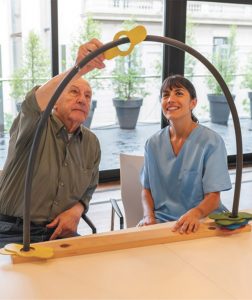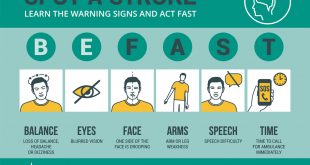

At Manatee Memorial Hospital, stroke patients receive rehabilitation during their hospital stay. The rehabilitation program is comprehensive – consisting of physical, speech, and occupational therapies – with the goal being to have patients move to the next level of care, either at home or at a skilled nursing facility.
The program is tailored to individual needs, considering factors like the severity of stroke, overall health and personal goals. Stroke survivors are at risk of developing secondary complications such as muscle weakness, pressure ulcers, and pneumonia. Rehabilitation helps prevent these complications by promoting mobility, proper positioning, and respiratory function.
“The ultimate aim is to maximize recovery and improve overall functioning and quality of life after a stroke,” explained Tim McCarthy, lead occupational therapist, who helps individuals regain independence in daily activities like dressing, cooking, and bathing by adapting tasks and using assistive devices. “We see patients in the emergency room, intensive care unit, and the stroke unit, while following them through the continuum of care.”
Therapists have additional stroke-specific training and certifications in neurodevelopment (NDT) and certified stroke rehabilitation (CSRS). They have all completed continuing education on the latest treatments to help increase the chances for a better recovery for patients.
Garlanda Jackson, lead physical therapist, focuses her work on restoring movement, strength, balance, and coordination through exercises tailored to the individual. “The needs are wide-ranging – from sensory, balance, gait, and coordination to return-to-work tasks,” added Jackson. “We work together as a cohesive team of therapists, which will interact or dovetail treatments for the patient’s optimal benefit. We also have an interdisciplinary approach that includes doctors, nurses, and pharmacists.”
Speech therapy is another important part of the recovery process. It focuses on communication difficulties, such as aphasia, which is the ability to understand and use language, and swallowing problems, often experienced after a stroke.
“We evaluate swallowing function with X-rays and bedside evaluations and have extensive training with speech, language, voice, and cognitive disorders,” explained Karen Turbin, lead speech pathologist. “We also provide assessments for patients with tracheostomies and laryngectomies.”
At Manatee Memorial Hospital, stroke rehabilitation is essential for promoting recovery, enhancing functional independence and improving the quality of life for individuals affected by stroke. By addressing the physical, cognitive, and emotional consequences of stroke, rehabilitation programs empower stroke survivors to rebuild their lives and pursue meaningful goals.
Manatee Memorial Hospital
206 Second Street East
Bradenton, FL 34208
941-746-5111
Physicians are on the medical staff of Manatee Memorial Hospital, but, with limited exceptions, are independent practitioners who are not employees or agents of Manatee Memorial Hospital. The hospital shall not be liable for actions or treatments provided by physicians. For language assistance, disability accommodations and the nondiscrimination notice, visit our website.
 Southwest Florida's Health and Wellness Magazine Health and Wellness Articles
Southwest Florida's Health and Wellness Magazine Health and Wellness Articles

